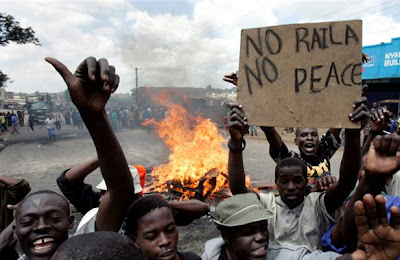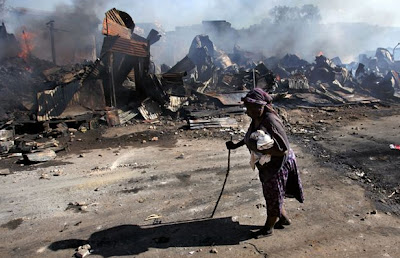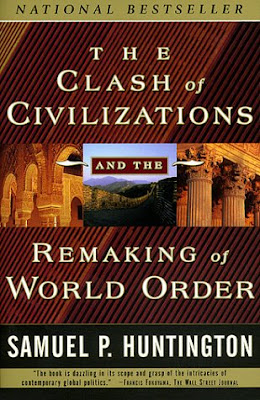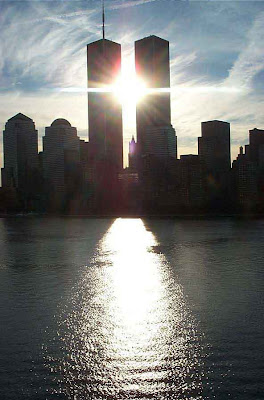>


As tribes in Kenya settle old scores in what has become an ethnic cleansing that probably will tear the land apart, I think of Samuel P. Huntington’s The Clash of Civilizations and The Remaking of World Order (1996). Ethnic clashes in a McWorld gone mad.
The fault lines between civilizations will be battle lines of the future.
I’ve been working on an article presenting Huntington’s thesis for a while, but it’s not quite finished. However, now is a convenient time to draw attention to what I’m writing about, so here’s Part One of what hopefully will be some sort of series if I can put it all together.
The conflicts of the post-Cold War era will arise not from ideological or economic differences but from cultural divisions.
Huntington said that in 1993. Many look upon his thesis as if it foresaw the ongoing confrontation with radical Islam (as seen from a Westerners point of view). Others claim Huntington is very vague in his ideas and over-simplifies things. Some say there’s a clash going on within Islam, a clash for the soul of Islam, whilst there’s another clash going on in the West. What is clear though is that there’s a war between secularism and the sacred, between universal rights and traditions. And so much more, of course.
Huntington predicted that fundamental differencies between the world’s seven or eight major civilizations will pave the way for global turmoil in the years to come, and that’s where we are right now. It’s not a matter of national interests, but of divergent values, ideas, cultures, identities, religions. Civilizations.
On April 18, 1994 two thousand people rallied in Sarajevo waving the flags of Saudi Arabia and Turkey. By flying those banners, instead of U.N., NATO or American flags, these Sarajevans identified themselves with their fellow Muslims and told the world who were their real and not-so-real friends.
We know who we are only when we know who we are not and often only when we know whom we are against.
He wrote an article about this and it was published in Foreign Affairs 1993. Three years later he expanded his thoughts in a book.

Huntington clearly states that Islamic and Western civilizations are likely to clash, because Islam is the only civilization that aspires universalist values and poses a significant challenge to the West. The West cannot claim any universalist values, since The West is unique (in the mind of Huntington), not universal. He also speaks about how Islam and Confusianism will rise against the West. He means that the West should be very cautious about this development and thus control immigration and assimilate immigrants to avoid a “cleft country”. Huntington means that the West should “increase the civilizational coherence” and not “intervene in the affairs of other civilizations”. In case of a World War III, the United States should get Japan, Latin American states and Russia on their side against potential Islamic-Confucian cooperation.
That is what he said.
I say that universalism might as well equal imperialism in non-Western eyes.
After the Cold War era the world was forced to look upon global politics in a broader sense. Back then there were two superpowers, the Soviet Union and the USA. Now there’s only one, and with September 11th it was clear that the world’s only superpower was pretty far from untouchable. It was very fragile and people really seemed to wake up from their ancient slumber this time – and they stirred up a whole lot of fear.
And here’s where Part One of this series ends.

>Sluta nu stödja det där idealistiska tramset Huntington spytt över världen och plocka upp dina Deleuzeböcker igen istället.
>Va, var stödjer jag Huntington någonstans?
>Kom och tänka på din blogg efter att ha varit på en föreläsning med religionssociologiprofessorn Anders Bäckström (Uppsala unversitet) som bl.a. lyfte fram olika konkurrerande teorier om hur framtiden kan komma att se ut ur ett (religions)sociologiskt perspektiv. Paradigmet tycks vara att det är oerhört svårt att förutse framtiden eftersom världen är så komplex. Precis som du säger så förenklar/extrapolerar Huntington alldeles för mycket, även om det snarast är en truism att det finns spänningar mellan islam/öst och kristendomen/Västvärlden.
Du känner säkert till Ingelharts teori om att det föreligger två parallella utvecklingar – en med liberala värderingar (företrädesvis på norra halvklotet) och en med dito traditionella (på södra halvklotet). Rätt uppenbart att det är så och även det känns lite förenklat. Då är Eisenstadts teori, som också togs upp under föreläsningen, fylligare och mer uttömmande – att det de facto sker en hel uppsjö av olika utvecklingsprocesser och att vissa löper parallellt inom ett och samma land/kultur/religiösa område. Dessutom säger han att utvecklingen inom religioner sker mycket långsammare än man kan tro. Så måhända kommer kanske Sverige alltjämt vara “kristet” om hundra år. Kontentan av föreläsningen, som primärt handlade om Sveriges framtid ur ett religiöst perspektiv, var att det dels sker en sekulariseringsprocess i bl.a. Sverige, och att dels sker en sakraliseringsprocess; religionen finns kvar inom Sveriges gränser men ger uttryck på nya och en mängd olika sätt (kristna tv-gudstjänster i stället för traditionella gudstjänster, nya religiösa strömningar där det immanenta blir viktigare än det transcendenta etc.). Det sistnämnda har väl i och för sig inte särskilt mycket att göra med din artikelserie, men jag tänkte att det kanske kunde vara intressant att delge (fast inte heller det är väl en direkt nyhet för dig, kan tänkas…).
För övrigt så ska det bli intressant att lyssna på Mattias Gardell, som arbetar på teologiska institutionen vid Uppsala universitet. Han ska hålla en troligtvis ganska kontroversiell (ur pöbelns synvinkel) längre fram under terminen. Har inte läst någon av hans böcker, men det skall det bli ändring på=)
>Nu sitter jag här och våndas över mitt fatala misstag. “Västvärlden” skall enkom skrivas med gemener.
>Steve, hade totalt missat att du skrivit denna intressanta kommentar! Sorry.
Jag kände inte till nån av de där snubbarna du nämner, men ska kolla upp dem vid tillfälle.
Mattias Gardell är guld. Har bevistat en del av hans föreläsningar. Läs “bin Laden i våra hjärtan” om du får tid.
Gällande de där teorierna, om du är intresserad av det där ska du definitivt läsa “Västerlandets undergång” i två volymer av Oswald Spengler som jag tjatat om en del på bloggen.
Ses på nästa Rape Date!